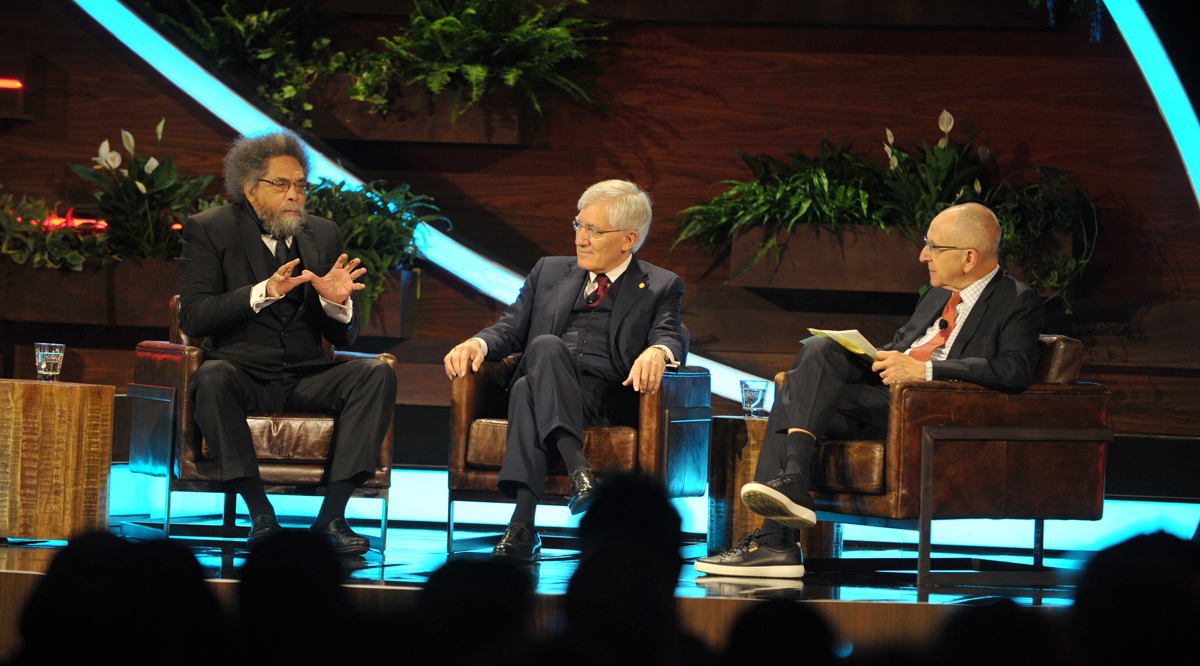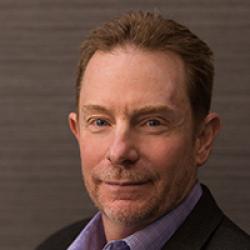
A painfully divided America can return to civil discourse only if people on all sides of the civic divide make themselves vulnerable to being challenged on their convictions, adopt the humility that they might be wrong, and respect the humanity of those who disagree with them.
That was the message that scholars Cornel West, PhD, and Robert George, JD, DPhil, delivered to more than 4,200 medical professionals gathered for the opening plenary on Nov. 12 at Learn Serve Lead 2022: The AAMC Annual Meeting, in Nashville, Tennessee.
“All of us need to be truth-seekers,” George, the McCormick professor of jurisprudence at Princeton University in New Jersey, said at the session, “Resurrecting Civil Discourse: In Conversation with Robert George and Cornel West.”
Moderator David J. Skorton, MD, president and CEO of the AAMC, set the stage by observing, “Civil discourse is becoming a lost art in the United States and elsewhere.”
George and West travel the country as a somewhat odd couple talking about how to revive that art. They met as professors at Princeton and became fast friends despite significant differences in their backgrounds and worldviews. George is a White conservative, while West is a Black liberal. Yet they frequently found themselves engaging in constructive, hourslong discussions about philosophy, politics, and social issues, and they taught a freshman seminar that explored those areas in depth.
They bonded because they were “real” with each other, said West, now the Dietrich Bonhoeffer professor of philosophy and Christian practice at the Union Theological Seminary in New York.
“He said, ‘Sincerity is my main credential,’” he recalled of George. “So often among the chattering class you get people who say one thing and act another way. The rhetoric goes this way and the deeds go another way. Do you have the courage to be yourself?”
For those willing to try, they said, step one is understanding what civil discourse is.
“Civil discourse is not simply listening to each other politely,” George said. “Civil discourse consists of talking and, above all, listening to another person with a different point of view in a truth-seeking spirit with a willingness to learn.”
To do that, “you have to cultivate the capacity to be courageous enough to be vulnerable,” West added.
Only by making our convictions vulnerable to challenge and ourselves humble enough to realize we might be wrong can we have constructive, respectful conversations with those with whom we severely disagree, they said.
“We have to have the courage to go into the future knowing we may change our minds,” George said. “It’s like getting on a train but you don’t know where the destination is. You don’t know who you’re going to be when you get off. That’s the challenge.”
Respect the person
Part of the challenge is that many people feel that their beliefs about social, personal, and political issues are not just positions but rather define who they are.
“Our convictions help to form our identities,” George said. “That’s not bad in itself. Yet when we wrap our emotions too tightly around our convictions, we become dogmatists, ideologues. That happens on the right, that happens on the left, that happens across the political spectrum.”
Thus, people see challenges to their beliefs about specific issues as challenges to their identities, driving them more and more to listen only to those who reinforce their beliefs. “We want people to reinforce what we already believe,” George added. “We want to stay away from people who challenge us. We want to demonize them.”
Everyone has strong convictions, he said, but “one of our convictions needs to be that we could be wrong. We know that great people, thoughtful people, intelligent people have been wrong” about matters great and small.
George noted that many people who turn out to be wrong about an issue or a cause were not lying but sincerely believed that they were right about something that was critically important to them or society.
“They think the cause is good. That’s why they joined the cause,” he said. “Because we are frail human beings, we can end up being zealots for bad causes.”
Even if you’re convinced someone is fundamentally wrong, do not dismiss them as people, West stressed. He gestured toward George sitting next to him and said, “I love this brother even when he’s wrong.”
“I begin with what it means to be a human being and what it means to love my crooked neighbor with my crooked heart,” West said. “You’re trying to stay in contact with their humanity, all their contradictions and insecurities and incongruities. You’ve got contradictions and insecurities and incongruities, too.”
When a member of the audience asked how to have civil conversations with people who aren’t interested, West advised them to start with finding common ground as people rather than starting the conversation with the issue that you disagree about.
“You have to find something to connect with,” he said. “Ask them about their mama. Ask them about their child. Ask them about sports. It lets people know you don’t come in with arrogance and condescension. It acknowledges, ‘This is who I am. This is who you are. Let’s see what small overlap we might find.”
Keep the conversation going
Discuss this session and more while networking with your peers in academic medicine during, and long after, Learn Serve Lead by joining the AAMC’s virtual community. More than 3,000 of your peers are already there!
